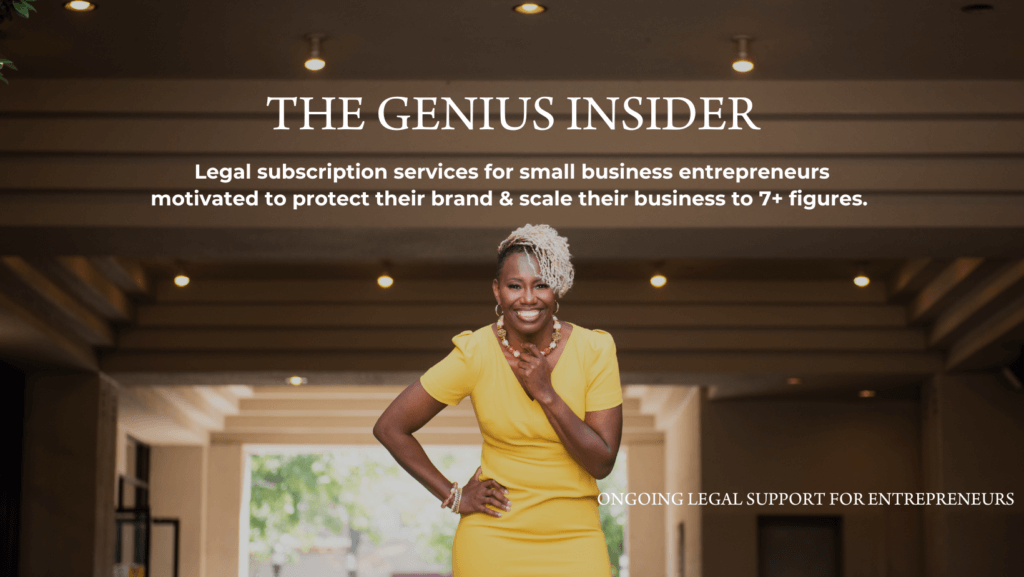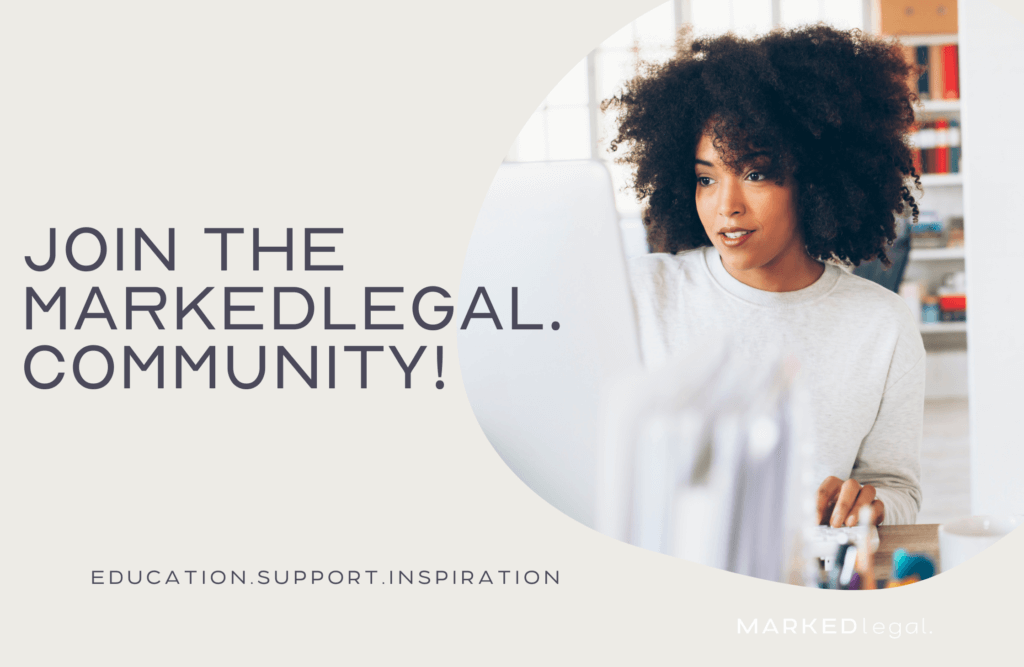Hello, geniuses. So last week, I shared a bit of my story and I mentioned one of the mantras that I’ve incorporated into my life and that is, “delayed is not denied”. And so before we jump into today’s episode, I wanted to share another mantra that has served me well. And Rashida Francis, she mentioned it on Instagram last week and I was so excited to hear that someone else, you know, was using something similar to what I’m using. And not to say that this particular thing is so unique that no one else has thought of it, nothing like that. But it’s just something that’s helped me.
So before I go to sleep and when I wake up in the morning, I remind myself that God is working everything out for my good. Even when the situation looks bleak, it’s all working out for my good. And so, well, okay, here’s the full mantra. The full mantra is… “Breathe LaConya. Your life is evidence that you are blessed and highly favored. Trust yourself and know that God is working everything out for your good. Expect great things to happen for you and they will.” And that’s what I say morning and night. I make sure that I do this daily. And the way that I got to this was, I don’t know, I just got fed up about a month ago of having all these lies in my head. I don’t know about you, but for me, it was a constant battle of doubt and insecurities. And I just got tired of it because I know that none of it’s true. It’s one thing when these things are, when you’re being attacked mentally and you’re still trying to figure it out and navigate, you know, is this true? Am I really feeling this way? Like I legit know that this stuff is not true. And I just got tired of constantly trying to play defense when these thoughts came about. So I decided to go on the fence. And what I did was I said, LaConya, you need a mantra. You need something that you can tell yourself daily, automatically when these thoughts come up.
So this is how I came up with it. The first thing I did was I asked myself, what is my truth? The truth is I’m blessed and highly favored. I recognized that at a very early age. I didn’t exactly know what that meant, but I just knew that I was blessed. Like I had favor, like things worked out for me. There was a period of time that I forgot, but me forgetting didn’t take away of the truth of the matter, right? That I am blessed and highly favored. The second question I asked myself was, what do I need to know? I needed to be reminded to trust myself and that everything is working out for my good. And then I ended it with, I expect great things to happen and they will as an instruction to myself on how to move throughout the day. So I put it all together and that’s how I came up with this mantra, if you will.
And I would say that you’d be surprised on how this has affected me positively, but you probably won’t be because we all know that power of life and death is in the tongue. Since I’ve been intentional about starting and ending my day with this mantra, it’s been a barrier. Like it’s really acted as a barrier against negative thoughts, situations that would normally stress me out and have me worried and anxious. Like they’re not doing that anymore to the point where I’m like, man. I’m so glad that I’m not anxious. Like this thing is like attacking me and doing all these things, but I’m not even anxious about it. I literally know that it’s gonna work out, that I’m expecting great things to happen. And they actually do. So I just wanted to share that.
Last night, I journaled that this is what it must feel like for the elders when they say, you know, lay your burdens down. I feel like this is what they meant. Just having that things aren’t bothering me type thing, even though it’s not saying that things aren’t happening, they are still happening, but just my reaction to them has changed with that constant reminder. Because I truly believe that when it comes to our mindset, I think that is the enemy’s biggest target, because if you can control the mind, you control everything else. And so we have to be on the offense. We have to be intentional about the content that we’re taking in and the messages that we’re giving ourselves so consciously and what we’re telling ourselves intentionally. I believe that.
So anyway, I’m not sure who this is for, but I know it’s for somebody because I didn’t come here on this podcast to discuss this today. So, but here it is. But last week, what we did, we started a new series because the first series did so well. On the topic was protecting, or last week we started a new series because the first one did so well on the topic of protecting your business in the day of technology. We talked about challenges that come along with it and I promise you that it wasn’t all doom and gloom. But today we’re here to take a look at some of the solutions to those challenges that we discussed last week.
So in this corner, we have the challenges, digital privacy, counterfeit products, domain disputes, and copyright infringement. In the other corner, we have the solutions, ready to ward off the digital evildoers to ensure your business is safe as it operates in the digital world. So last week we talked about four challenges, and today we’re going to explore four solutions. So let’s get into episode 125 of the Own You Genius Podcast.
The first solution, that I would talk about is going to be copyright protection. Copyrights protect original work that are in a fixed tangible form. So your digital content such as courses, eBooks, your website copy, and even your email sales flannel copy, the things that we mentioned last week, they all fall under this category. But most people aren’t aware that the protection starts from the moment the work is created. It doesn’t require publication or registration. But if you want to enforce your rights, you’re going to want to register your work.
As a copyright owner, you should be aware of what’s called the Digital Millennium Copyright Act. And it was enacted in 1998 to provide copyright owners a tool to address the increasing copyright infringement that was happening. Something as simple as a right click of a mouse could cause irreparable harm to a business owner. So the DMCA did two things. One, it made it a criminal offense to kind of circumvent the technology to access copyrighted material that you weren’t supposed to. And then the second thing it did was it allowed copyright owners the right to contact the website host to report the infringement, meaning that someone has your copy. And you see it on a website somewhere. You can contact if that website is hosted by KINSTA. I think that’s who we’re posted by. You can contact KINSTA and let them know that, hey, this website here has copyright infringement material on it and they will need to take it down or else they’re going to risk being liable for copyright infringement. And you see it on social media. I see it on social media all the time. And I remember a few years ago the shade room was accused of copyright infringement because they were using unauthorized photos of celebrity on their pages and then their entire page was shut down because again you can contact the host in that case the host was Facebook and they will take it down. They’ll do an investigation. Sometimes they just they’ll take it down, but they won’t delete it until they’ve finished their investigation. YouTube does the same thing. You go in there and you’re watching the video and you save it on your playlist, then you come back and watch it. This video is removed for copyright infringement. So the DMCA is a great tool and resource that all business owners should know.
You also want to make sure that you’re utilizing software that makes it harder to download and access your work without your permission. For example, I use WordPress. I know there are other website hosts out there, but I use WordPress. It was around before SquareSpace and Wix and all the other things. And one of the plugins that I have, it makes it so that people can’t right click on the website. So they can’t just copy and right click and copy, which makes it more difficult for them to copy. If you want this copy, if you want what’s on this website, you are really gonna have to work for it.
The other thing that I use, I use WP Fusion and Active Campaign together for my courses. For those of you who don’t know, I host my courses on my website. And I use those two softwares it allows me to design access to users if they don’t have a specific tag. So if a student wants to share the URL to the particular course they can if they want to, but the person that they’re sharing it to, if they’re not registered, they won’t be able to access it. And I think that’s pretty cool.
And then another thing that you can do is use Vimeo rather than YouTube to host your course content to make it harder to download the videos. You know, and then there are tools and platforms out there that allow you to limit like how many downloads someone can have of your work, how many devices and which devices can have access to it which allows you to follow Netflix lead and prevent the sharing of passwords.
So there are things and tools and resources out there to combat the digital piracy and the stealing of the content. And having your things protected by copyright is the first step you want to do so you can make sure that you can enforce your rights.
One other thing I would mention as it relates to copyrights is that you can also add visible or invisible watermarks to your digital signatures. And that way it can help establish ownership and defer infringement. But I know these people are out here taking watermarks off. But you know what I noticed the other day? So I’m running a Facebook ad and I like to repurpose. And so I have a reel that I just want to use for my ad. And it wasn’t a reel that was using anyone else’s intellectual property, it was just me talking on camera. So I just use that video. But what I noticed was that Instagram has announced that the watermark moves, right? So people can’t just take it away. So it has my Instagram page, but first it starts in the right corner then it moves to the middle of page then it moves to the bottom then it moves up and so that way you can try to Take it off if you want to but you can’t because catch me if you can right?
Anyway so the first Solution to the challenges that we were talking about last week is copyright protection and then making sure that you have tools in place to help you enforce your rights and prevent people from taking your stuff.
The second one that I will mention is trademark protection, right? Especially if we’re talking about counterfeiting. Registering your trademarks with the USPTO provides protection and exclusive rights to use that trademark throughout the United States. And what it does, it helps prevent others from using your same or similar mark that may cause confusion amongst consumers. So, oh man, what was an example? I had a great example, but then I just lost it. So, I just lost it. It is what it is. But you get my point. So, I always give the example when you’re going to the grocery store to buy peanut butter, you know which brand of peanut butter you want to get, right? You know, sometimes you don’t even have to see the name, you just see the colors. We use Jiffy and you see the red and the blue and the little bit of green. Not Jiffy, that’s the cornbread, oh my gosh, Jif. Yeah, that’s what it was. And so we take, and you can just get that, you can just go straight to it, but what happened if there was a brand with similar colors and maybe it was Jiffy instead of Jif, and you just grabbed it, thinking you were grabbing the brands you’re used to, and now this one is all watery and has a little twang to it, and you’re like, what in the world? So anyway, that’s what trademarks protect.
One of the things you want to do once you’ve registered your trademark is you want to regularly monitor it. You want to keep an eye out on platforms like social media and different e-commerce websites to identify any unauthorized use of your trademarks. And if you see it, it’s one thing to monitor it and then you know it’s out there. But then you have to take the next step. And that next step is enforcing your rights. The reason you make the investment, or one of the reasons you make the investment in registering your trademarks, is so that you could have the right to use this without any type of conflicting uses. If you don’t enforce your rights, you will lose your rights. So enforce them, right?
Did you know this is the final thing that I want to say about point number two, which is trademark protection? And it’s a question. Did you know that when you register your trademark that it provides protection with the custom and boarding protections? Yep, it does. The first thing you need to do is make sure that your trademark is registered on the primary register. So you have the primary register and then you have some marks that are found descriptive, and then they have to go on the secondary register until they have become distinctive. So if you’re on the primary register, that’s the first step to qualification. The next thing you wanna do is apply with CBD, Custom Border Protections, you wanna record your trademark, and then you wanna pay the fee. And once the application is approved, you can provide a list of authorized manufacturers and importers so that they’ll know who’s supposed to be shipping these packages in you know these goods into the United States, and if you know any potential unauthorized Manufacturers you can also give a list of those manufacturers to CBD and they’ll be on a lookout. So if they see them they know not to let them into the United States market through customs. Isn’t that pretty cool? I think it’s pretty cool.
The third thing, the third solution I would throw out there is people, honey, people. Listen, if we’re speaking of customs, we’re talking about counterfeiting. The people you work with can make a huge impact on reducing infringement. Just take a look at your supply chain management. Have systems in place to ensure that things are authentic and that the integrity of your products are how you want them to be. And this can look like something as simple as verifying your suppliers. Something like conducting regular audits and implementing product tracking and authentication systems. So there’s some things that you can do in-house and making sure that you’re working with the right type of people and I always say tell people, you know, contracts are only as good as the people that you’re signing them with. If you’re going into business, if you’re selecting a manufacturer who has a reputation of being shady, you’re gonna get what you pay for. So. It doesn’t matter what your contracts say. So again, venture suppliers.
The other thing, and I mentioned this earlier, did I mention it? Maybe I didn’t. Anyway, I’m gonna mention it now. You wanna make sure that you establish partnerships and collaborations with e-commerce sites that have something in place to help identify and remove counterfeit products. And I know Amazon has the Amazon registry program in place to help combat counterfeit goods. And I’m pretty sure that other platforms do the same, but I just happen to know about Amazon registry because we have some clients that we did some work for specifically for that.
Finally, finally, listen, the thing that you can do, the fourth thing, the final thing that we’re talking about today that you can do to counter the things that we talked about last week, the digital piracy and the counterfeit goods and all those things is educate the people, right? Take the time to educate employees, stakeholders and customers, talk to your employers, your partners, your stakeholders about the importance of IP protection and the potential risks associated with infringement. Train them in the best practices to prevent unauthorized use of your guys or your companies. Train them in the best practices to prevent unauthorized use of your company’s intellectual property.
And then talk to the consumers. Raise awareness about the value of having authentic products and the risks associated with purchasing counterfeit or pirated goods. Like, I know that I saw a video and I shared it on my, what is it, on my Instagram. And it was the Pyrex. I want to say the brand was Pyrex. The glass cookware, you put it in the oven and it heats up and it doesn’t break, but lately it’s been breaking. And what she said was there’s two different ones. And this is not necessarily that it’s counterfeit, but this is just the importance of trademarks, right? And in educating people. So when it’s in capital letters, then that’s the original one that can be heated without breaking. If you see it in the lowercase letters, then that’s the one that’s inferior. And you probably should just leave it at the store because it’s gonna break on you.
But in a nutshell, the challenges that are faced by doing business in a digital world can be combated by taking steps to identify and register your intellectual property and then using the benefits that come with registration to enforce your rights. Can be combated by using the right tools and software to make infringement more difficult, by vetting the people that you outsource to, and educating your people on the value of authentic products and the risks associated with counterfeit goods. People, come on now, like we don’t want counterfeits at all.
Let me ask you this question. What steps are you taking in your business to protect it online? Let me know in the comments and then make sure to tune in next week as we discuss all the wonderful opportunities that come with operating your business online.








Responses